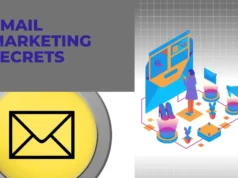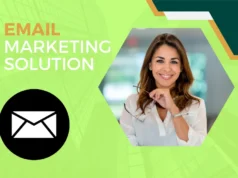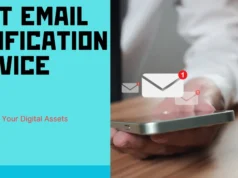ConvertKit is an email marketing and automation platform designed to be user-friendly for bloggers and online course creators. It provides tools for building and managing email lists, creating landing pages, automating workflows, and delivering targeted content to subscribers. These tools help manipulate all users who are new to this technology. ConvertKit helps peoples and creators work smarter with email, automation, and monetization tools to drive continuous growth. Approximately 643,414 creators send over 2.6 billion emails each month.
The central marketing hub you depend on
- Expand your viewership or audience – Increase subscribers with beautiful landing pages, signup forms, and link pages that make your work stand out.
- Organize your marketing automatically- Create lasting connections and promote like a pro with our intuitive email editor and powerful sales funnels.
- Market and sell your digital goods/products – Market and sell your digital products and subscriptions with ConvertKit to drive higher conversions and save on fees.
Features of ConvertKit
ConvertKit provides essential features, including
- Subscriber tagging and segmentation
- Landing page/opt-in form builder
- Email broadcast and automation features
- Integrations with popular platforms like as WordPress, Shopify, and Leadpages – to name but a few.
- Detailed subscriber analytics and reporting
ConvertKit aims to simplify email marketing for content creators by providing a streamlined and user-friendly platform for building and engaging with email lists. The unique features of ConvertKit show the abstract model with many tools. Automating routine tasks frees time for content creators to focus on creating valuable content for their audiences. It also helps to make the creation of a landing page attractive, which is the core part of email marketing—one of the essential features is integration with some popular platforms that enhance communication.
Email marketing best practices to build a lasting content strategy
Whether you create for an audience of 70 or 200,000 the only way to succeed is to find a way to connect with them. Email is a personal channel. You own the relationship with your audience.
PROS AND CONS OF CONVERTKIT
Pros of ConvertKit:
- User-friendly interface:ConvertKit has a simple and intuitive interface that makes it easy for people with limited technical skills or who are new to this technology.
- Automation tools:ConvertKit provides a range of automation tools that can be used to create workflows and target specific segments of subscribers.
- Landing page builder:ConvertKit offers an intuitive landing page builder to create customized opt-in pages easily without the need for technical knowledge or skills.
- Integrations:ConvertKit provides businesses that rely on multiple devices for work purposes with the flexibility to increase accessibility to their target audiences and expand services available to them.
- Reporting and Analytics:ConvertKit provides offers businesses detailed reports and analytics to monitor email campaigns, make data-driven decisions to enhance performance with results and ultimately reach optimal performance with results. Email Marketing Strategies to Achieve Maximum Email Performance. Email marketing tools offer numerous solutions for crafting the ideal email message to send to your audience – such as user-friendly email builders or coding on your behalf; collecting leads with signup forms compliant with international regulations like GDPR while including automation features like automated emails scheduled send times and segmentation features – perfect!
- Be knowledgeable of rules and regulations
Make yourself familiar with rules and regulations
Before you get started, take the time to brush up on the different rules and regulations that apply to subscribers based in other jurisdictions. The first and most important rule to know is that you can’t buy an email list. Some essential laws are mentioned below if you plan to send emails will be helpful.
- CAN-SPAM Act: This law requires you to identify yourself clearly and give subscribers an easy way to opt-out. This government guide provides a complete overview.
- GDPR:This privacy law applies to subscribers based in Europe, but its passage has created new standards for marketers everywhere. Essentially, you’ll need to ensure a solid record of data collection and explicit consent from your subscribers to opt in. Still, this official guide from the EU details everything you need to know.
- CCPA: This California privacy law is similar to GDPR because it’s mainly about how and where you collect data about your subscribers.
All of these acronyms can be overwhelming. We recommend checking with legal counsel if you need clarification on a specific regulation to be on the safe side.
- Know your audience and remain curious: This is a golden rule for all online and offline marketing types. Audience research is essential to know your ideal client or customer, but that’s the beginning. As your email list grows, your audience will likely evolve. The more you understand your subscribers, the more you’ll learn how to serve them. And the better you can serve them, the more trust you will build. This trust is crucial when pitching freelance services, digital products, or physical products.
- Offer something of value to attract the right subscribers: One of the best ways to offer something of value to your email audience is to provide lead magnets on your blog, website, podcast, or any other content platform you run. These lead magnets will help you educate your audience about the importance of a topic within your niche and help you build trust. The proper freebies and forms can put you above the average opt-in rate of 2%.
- Reconfirm interest with a double opt-in: You only want subscribers on your email list who want to be on it. You also want to eliminate the amount of spam email accounts that will sign up for your email list. Both of these things can be accomplished when you use a double opt-in.
When you use a double opt-in, subscribers can confirm that they want to add their email address to your list. This ensures subscribers are engaged with your email list and genuinely want to be there.
- Always keep a clean email list: You can have hundreds of thousands of subscribers, but if barely anyone opens or clicks on your email, you won’t grow your business. Instead, focus on building the most engaged email list possible. You want to attract and nurture email subscribers who are excited to hear from you and want to open, click, and interact with your emails. At least once a quarter, do a list hygiene check:
Send a re-engagement email campaign to subscribers who last engaged with an email 90 days ago. Prune any subscribers with email addresses that come back with a hard bounce, who have marked you with a spam complaint (the worst!), or those who still don’t engage with your email campaign. Make sure you’re honouring unsubscribers regularly as well.
- Ask your subscribers to safely–list your email: If you’re unsure if your email lands in the inbox, spam folder or promotional tab, and then ask recipients to list your email safely. Not every subscriber will do it, of course, but adding your email address to their contacts helps your email deliverability in the long run.
You can show them an easy tutorial of how to do this in your first email after they’ve confirmed their email address or in a custom thank you page. Remember that each email host handles allow listing a little differently, so linking to the specific instructions may be helpful.
Segment your list for more precise messaging: Within your audience, you may find variations in stage of life, business, skillset, or product interest. Rather than send every single person on your list the same email, use email segmentation. This is a great way to build in additional personalization, which will help your subscribers feel cared for and understood. You don’t have to segment every single email, but by keeping your audience’s goals in mind as you create content, you’ll find more targeted messaging will make them more likely to engage or convert.
- Never stop growing your email list:Understanding what parts of your acquisition efforts are working and what could be improved is critical to ensuring your email list is constantly growing. Rather than look at the number of subscribers daily, consider your overall list growth rate.
|
[(number of new subscribers) – (number of unsubscribers + spam complaints)] ÷ Total number of subscribers} * 100
|
Develop value-add lead magnets like ebooks, free courses, or webinars to turn social media followers into email subscribers. Run paid ads to those lead magnets to drive more signups. Ask existing subscribers to forward and share your email. Add a newsletter referral program to your email marketing to grow 35% faster but you can do only some of these ideas at a time.
That’s why collecting and analyzing data about your email marketing performance is so important. Monitoring key performance metrics (KPIs) like list growth rate, unsubscribe rate, and click-to-open rate (CTOR) gives you a clear picture of how well you are drawing in new subscribers—and how engaged they are once they’re on your list. Once you know that information, you can prioritize the programs that best fit your needs.
- Optimize your email subject lines and preheader text: Your email subject line makes or breaks your open rates.
When you write your email subject lines:
- Keep the length to around 50 characters or less so it is visible on desktops and mobile devices.
- Tease what your email will be about without giving it all away.
- You can add emojis if it fits your brand personality.
- Avoid spammy words like “final,” “state-of-the-art,” “discount,” “exclusive,” or “free.”
- Subject lines work together with your preheader text and the tiny blurb in the email preview in your subscriber’s inbox.
Typically, the blurb is taken from the first sentence of your email. But you can customize your preview text in most email builders. You’ll want to make it count since it’s your last chance to hook a reader and convince them to open your email.
- Teach everything you know: When you teach everything you know, it builds a strong connection with your ideal audience and authority and credibility. “You must have something that works first,” says fabric designer Bonnie Christine. “You have to know your ideal customer inside and out. You have to know their heart, you have to understand what keeps them up at night, and then you have to have something that truly serves them. Email marketing is a lucrative channel, but you must do the work first. Focus on connection and education with your subscribers to best serve them, and the growth will come. Sharing your unique creative process and philosophy may be the perfect inspiration someone needs to unlock their next level of motivation.
CONS OF CONVERTKIT
- Limited customization options: ConvertKit has limited customization options compared to other email marketing platforms. This is the main reason for not allowing more customized options.
- No free plan:ConvertKit no free program for its users or subscribers. Email marketing can be costly for small businesses and individuals, particularly for industries with smaller production runs that may find ConvertKit too costly and only offering limited templates that may meet some business requirements.
- Lack of Features: ConvertKit offers limited features compared to more comprehensive platforms; only certain functions may be accessible here. ConvertKit Offers Limited Support Options: With regard to support options, ConvertKit only provides limited support options such as no phone support and limited live chat support. Below are the effective email marketing best practices to maintain a healthy list.
ConvertKit is an ideal email marketing platform for content creators and bloggers seeking a straightforward yet automated email platform, but businesses looking for comprehensive solutions should seek other media.
Check Alternative Bluehost Login
Review of ConvertKit, this article covers all the pertinent details regarding a review of ConvertKit, so take the time to carefully read through it! It covers every element that pertains to it.












